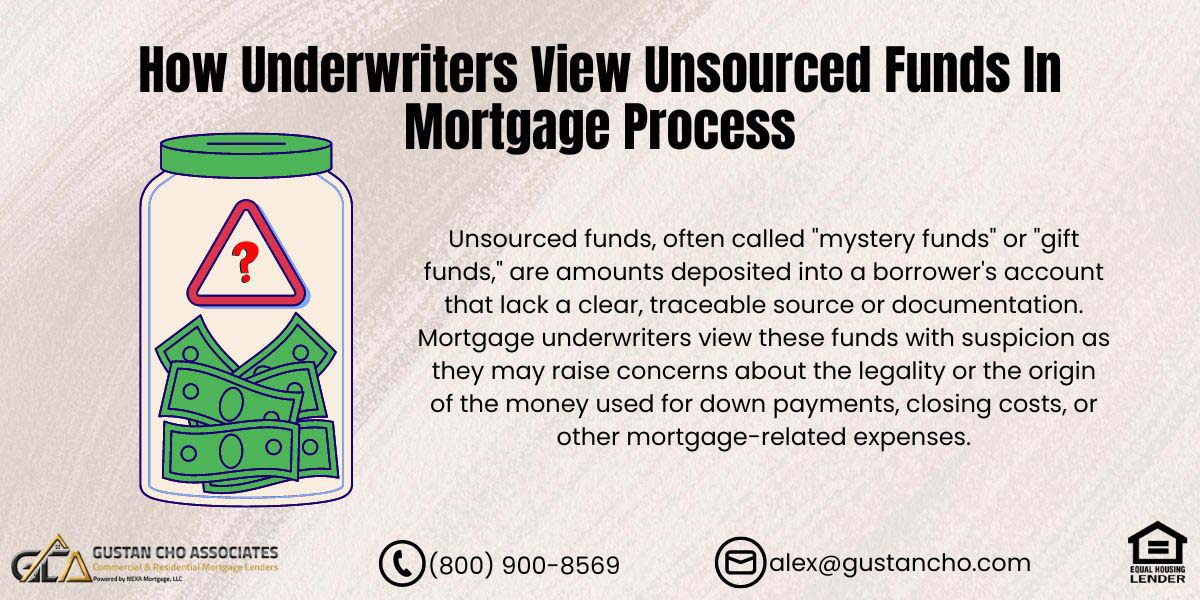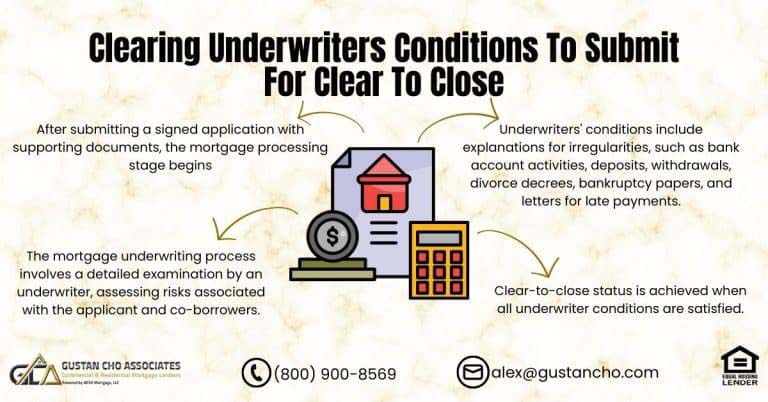This guide covers how underwriters view unsourced funds while analyzing and reviewing a borrower. Unsourced funds have no paper trail, so mortgage underwriters cannot source the funds needed for the mortgage asset qualification process.
Borrowers need to source the funds to use the funds towards the home buyer’s down payment or closing costs on a transaction.
Mortgage underwriters view unsourced funds, also known as “mystery funds” or “gift funds,” with caution. Underwriters view unsourced funds as raising concerns about the source of the money being used for the down payment, closing costs, or other expenses associated with a mortgage application.
The Role of the Underwriter in the Mortgage Process
Mortgage underwriters are responsible for ensuring that the funds used to purchase a home are legitimate and not the result of fraud or money laundering. Mortgage underwriters typically view unsourced funds by scrutinizing consistent, inconsistent, irregular, and large deposit deposits.
Underwriters will typically require borrowers to provide documentation and proof of the source of any funds used for the down payment and closing costs.
If the mortgage underwriter sees any irregular or large deposits, the underwriter will need to the source of the funds. If the irregular or large funds shown in the bank statement cannot be adequately verified, it can raise red flags.
Worried About Unsourced Funds in Your Bank Statements?
Contact us today to understand how unsourced funds can impact your mortgage approval and how we can help you navigate the process.
What Does a Mortgage Underwriter Check?
A mortgage underwriter plays a crucial role in the home loan approval process by assessing the risk of lending to a potential borrower. Here’s what they typically check:
- Credit Score and Credit History: This is one of the primary factors in determining the borrower’s financial reliability. A higher credit score suggests a lower risk to the lender.
- Income and Employment Verification: Underwriters review the borrower’s job stability and income sources. This includes checking employment history, salary, bonuses, and any other consistent income to ensure the borrower has the means to repay the loan.
- Debt-to-Income Ratio (DTI): This ratio measures the percentage of a borrower’s gross monthly income to pay debts. A lower DTI indicates more disposable income, reducing the lender’s risk.
- Asset Verification: Assets are important as they can be used for making the down payment, paying closing costs, or serving as financial reserves. Underwriters verify assets through bank statements and other records.
- Property Appraisal: The underwriter verifies that the appraisal provides sufficient collateral for the loan amount by meeting or exceeding the mortgage value.
- Loan-to-Value Ratio (LTV): The LTV ratio is all about how much you borrow compared to the value of what you’re buying. If the ratio is lower, there’s less risk involved since the borrower has more skin in the game. A lower LTV means you’ve got more equity in the property.
- Additional Documentation and Compliance: The underwriter ensures all the necessary documentation and that the loan meets all applicable laws and guidelines, including those set by the government or the mortgage lender.
By assessing these factors, mortgage underwriters evaluate the probability of the borrower’s ability to repay the loan, safeguarding the lender’s interests.
Do Mortgage Underwriters Check Bank Statements Before Closing
Mortgage Lender Requirements
Mortgage lenders usually want to see 60 days’ worth of bank statements to assess a borrower’s financial stability. They’re pretty thorough when it comes to reviewing each deposit, especially trying to determine where that money came from.
What Counts as a Red Flag Deposit?
Payroll deposits are generally straightforward to verify, as they occur consistently, either weekly or biweekly. However, irregular deposits can raise questions. For instance, if a borrower has a sudden large deposit of $1,000, it will catch the underwriter’s attention.
Underwriters are particularly concerned with deposits greater than $200. Every irregular deposit must be sourced, meaning the borrower needs to provide a clear paper trail to explain where the funds came from.
Examples of Sourcing Deposits
For instance, if the $1,000 deposit is identified as gambling winnings, it is deemed “unsourced funds”. It cannot be used toward the borrower’s down payment or closing costs. On the other hand, if the deposit is from the sale of a car, it can be deemed a valid source. In this case, the borrower would need to provide documentation such as a copy of the check, bill of sale, title, and deposit slip to verify the source of the funds.
Understanding these requirements and types of deposits can help streamline the mortgage approval process.
What Do Mortgage Underwriters Look For in Bank Statements
Mortgage underwriters assess the overall risk of the loan, including the borrower’s ability to repay and the potential for fraud or misrepresentation.
Unsourced funds can increase the perceived risk of the loan, which may result in additional requirements or a higher interest rate.
Any inconsistencies or irregularities in the borrower’s financial documentation, such as sudden large deposits, undisclosed loans, or unexplained transfers, can raise concerns for underwriters. They may request additional documentation or explanations to address these issues.
Seasoning Requirements For Cash Deposits To Become Source Funds
Underwriters might have rules about how long money needs to stay in your account before you can use it for a mortgage. This is to make sure the money isn’t just a fresh deposit from somewhere shady. It’s really important to be open and honest with your mortgage lender about where your funds come from. Trying to hide or fib about your money can result in your loan being denied or even legal trouble.
If you plan on using gift funds or have any money that can’t be clearly traced, it’s a good idea to team up with your lender to make sure you’re following all their paperwork and verification steps. That way, you can avoid any hold-ups in getting your mortgage approved.
Concerned About Unsourced Funds in Your Mortgage Application?
Contact us today to find out how to properly document your funds and secure your mortgage.
Cash is Considered Unsourced Funds
Cash is considered unsourced and cannot be used unless deposited and seasoned for 60 days. Many individuals feel more secure keeping cash at home than in a bank, but this can create challenges in home buying. For instance, mortgage lenders do not treat cash as assets, meaning it cannot be used as part of the down payment or earnest money for a home purchase.
To avoid complications, homebuyers should opt for bank-related transactions, like money orders or cashier’s checks for earnest money, and ensure that all funds are sourced. Additionally, borrowers need to present their bank statements from the past few months to verify their financial history. Any large deposits or transfers that cannot be easily explained may trigger further scrutiny, so it’s essential to keep thorough records.
How Can Borrowers Use Gift Funds on a Home Purchase
If the unsourced funds are gifts from a family member or friend, mortgage underwriters generally require a gift letter signed by the donor and the borrower. The letter should state the nature of the gift and the amount and confirm that it is not a loan. The funds are solely a gift and do not need to be repaid.
The underwriter may also require 30 days of bank statements from the donor of the gift funds to prove the legitimacy of the gift.
Many people offer they will use gift funds for the down payment on a home purchase. Many homebuyers receive cash gifts from family members. Gift funds can be used towards the down payment and closing costs on a home purchased. Unsourced funds cannot be used.
Checklist for Documenting Gift Funds
- Canceled Check: Provide a canceled check from the donor to the recipient.
- Source of Funds: Cash and unsourced funds cannot be used; all funds must be documented.
- 30-Day Bank Statement: Donors must provide a bank statement from the last 30 days showing the gift funds in their account.
- Transfer of Funds: Include proof that the funds were transferred from the donor’s account to the recipient’s account.
- Gift Letter: The donor needs to complete and sign the lender-provided gift letter. The letter must state that the gift funds are not a loan and do not require repayment.
- Bank Statement Timeline: Only bank statements dated within the last 60 days need to be sourced.
By following this checklist, you can ensure that all required documentation for gift funds is properly organized and complete.
Solution To Unsourced Funds
If you’ve got cash stashed away, like in your mattress, you can eventually use it for your closing costs. But if that’s your only cash option, you need to put that money into your bank account ASAP and let it sit there for 60 days. Lenders just want to see 60 days’ worth of bank statements. After that, any money you deposit doesn’t need an explanation for where it came from. Remember, mortgage lenders will stick to asking for 60 days of statements.
Homebuyers or homeowners needing to qualify for a mortgage with a lender with no overlays on government and conforming loans can contact us at Gustan Cho Associates at 800-900-8569 or text us for faster response. Or email us at alex@gustancho.com. Gustan Cho Associates has ZERO LENDER OVERLAYS on FHA, VA, USDA, and Conventional loans. Gustan Cho Associates are correspondent lenders on non-qm loans and bank statement loans for self-employed borrowers.
FAQs About How Underwriters View Unsourced Funds In Mortgage Process
Q: What are Unsourced Funds?
A: Unsourced funds, often called “mystery funds” or “gift funds,” are amounts deposited into a borrower’s account that lack a clear, traceable source or documentation. Mortgage underwriters view these funds with suspicion as they may raise concerns about the legality or the origin of the money used for down payments, closing costs, or other mortgage-related expenses.
Q: Why are Unsourced Funds an Issue in Mortgage Underwriting?
A: Unsourced funds can indicate potential risks such as fraud or money laundering. Mortgage underwriters are responsible for ensuring that all funds used in a mortgage transaction are legitimate. They scrutinize unsourced funds to protect against these risks, as they could impact the lender’s decision on the loan approval.
Q: How do Mortgage Underwriters Handle Large or Irregular Deposits?
A: Mortgage underwriters require documentation for large or irregular deposits in a borrower’s bank statements. Each deposit over a certain threshold (commonly $200) must be adequately sourced with a paper trail. These funds must be verified to be eligible for use towards the down payment or closing costs.
Q: What is Required from Borrowers when Using Gift Funds for a Home Purchase?
A: If using gift funds, borrowers must provide a gift letter from the donor that clarifies the nature of the gift, its amount, and a statement that it is not a loan and does not need to be repaid. Underwriters may also require additional documentation, such as bank statements from the donor, to verify the legitimacy of the gift.
Q: What are the Seasoning Requirements for Cash Deposits to Become Sourced Funds?
A: Seasoning requirements stipulate that funds must have been in the borrower’s account for a specific period (often 60 days) before they can be used in a mortgage transaction. This ensures that the funds are not recent unsourced deposits.
Q: Can Cash be Used as a Source of Funds in Mortgage Transactions?
A: Cash is generally considered unsourced and cannot be used directly in mortgage transactions. Borrowers must deposit cash into a bank account and let it mature for the required period to meet underwriting guidelines. If cash deposits are to be used, they must be documented to show their origin.
Q: What do Underwriters Look for in Bank Statements?
A: Underwriters look for consistency and transparency in financial transactions. They assess bank statements for inconsistencies, unexplained large deposits, undisclosed loans, or other irregularities that could indicate financial instability or fraudulent activity.
Q: How Can Borrowers Ensure their Funds are Accepted by Mortgage Underwriters?
A: Borrowers should maintain clear records of all transactions and deposits. All funds in a mortgage transaction should have a clear, documentable source. Transparency with lenders about the origin of funds and cooperation in providing necessary documentation can help ensure smooth mortgage application processing.
Q: What Happens if Borrowers Attempt to Hide the Source of Funds?
A: Misrepresenting or concealing the origin of funds can have serious consequences, including rejection of loan applications and possible legal action. Openness and honesty with lenders are essential for a successful mortgage approval process.
These FAQs explain how the mortgage underwriting process handles unsourced funds, emphasizing the importance of transparency and proper documentation in securing a home loan.
This blog about How Underwriters View Unsourced Funds In Mortgage Process was updated on April 23rd, 2025.
How Do Underwriters View Unsourced Funds in Bank Statements?
Reach out now to understand how we can help you show proof of your funds and keep your application on track.











FHA is requiring I pay 100 thousand I owe in biz taxes. I have the money in cashiers checks but not in traceable funds in a bank acount for my business or personal accounts. I had a friend that was going to let me give him the 100 K and then write a check to IRS but he suddently got cold feet thinking it was not legal.
Can you please elaborate your question. I do not quite understand your case scenario. Why is FHA requiring for you to pay $100,000? Are you in the middle of the mortgage process with a lender?
Hi, I have a question. My dad and bro gave me $2,600 cash wedding gift. I deposited it a month later. I’m on the process of getting a mortgage they asked for bank statement from the donor’s gift fund. I cant provide bank statements from my bro and dad would this affect my loan from getting approved? I have enough money to cover closing cost without using that money.
That is fine then. You do not have to provide bank statements of the donor if you are not going to use those funds.
Hello,
My aunt gave me a gift for my home purchase for $9000, but I cannot provide the statement to source these funds. I don’t need to use this money towards closing costs because I have enough funds in my account to cover closing without it. Will this affect my mortgage?
You need a gift letter and proof of the canceled check on conventional loans. FHA loans require bank statements.
My aunt used a cashier check when giving me the funds. Can I just give them the check without the bank statement?
On conventional loans, you can just give the lender a copy of the canceled check. On FHA loans, you need to provide a gift letter, the donor’s bank statement, and your bank statements.
The underwriter is asking me for the bank statement for the check. I am doing a conventional loan.
On conventional loans, if you are using gift funds, all you need to provide is copy of canceled checks. Front and back.
Can the funds be excluded from the deal? I don’t need them to close on the house.
Yes, you do not have to provide bank statements or canceled checks if you are not using the gift funds.
Will this be a problem for me since the funds are in my account? How does this process go?
It will be fine. It will just not count.
Thank you. I’m suppose to close next week. I’m scared thinking the underwriter is going to pull back my loan.
I am trying to use some of the down payment from the proceeds from another property (it was free and clear). How long do I need to be on the deed in order to use the money? I already have 10% my own money,
Right away.
Bank is asking for a paper trail (bank statements) on funds used to payoff some open revolving credit cards (as a condition to close).
I can see them asking for that on any funds used for the purchase of the property, but wanting a paper trail for funds used to pay off preexisting established lines of credit seems like overkill.
If I win the $50k in the lotto and decide to use those funds to pay off all my bills, they shouldn’t need me to source that.
PS: I’ve already provided the bank with IRA and bank statements showing I have sufficient funds to close, plus extra funds to pay off those credit cards. How I eventually decide to pay off those credit cards before closing s/b my prerogative. Yes?
You are correct. You must have a new inexperienced underwriter. Have your loan officer to contact the underwriting manager.
Thanks, for some reason I thought I need it to be on the title for at least 6 months.
I unintentionally paid my $1k emd with a postal money order that I paid for in cash and sent it priority mail right then and there. I did not know I had to withdraw the funds from my bank for it to be sourced until today when I received and email from my financing agent requesting a copy of the check and a bank statement showing it being pulled from my account. I contacted my LO to see what we can do to rectify the situation but he said he has to wait till Tuesday to speak to the financing agent. Is there any way to resolve this? Will financing allow me to correct my mistake by sending a cashier’s check expedited in place for the one I previously sent
The cashier’s check will not count. You need to show that the earnest money check has been sourced by showing it was verified funds in your checking account. You have the sellers send you back the earnest money check and send them another $1,000 from sourced funds.